Related Research Articles
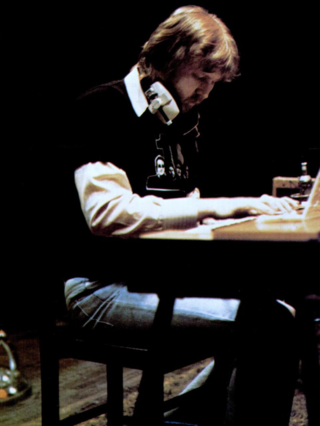
Harry Edward Nilsson III, sometimes credited as Nilsson, was an American singer-songwriter who reached the peak of his success in the early 1970s. His work is characterized by pioneering vocal overdub experiments, a return to the Great American Songbook, and fusions of Caribbean sounds. Nilsson was one of the few major pop-rock recording artists to achieve significant commercial success without performing major public concerts or touring regularly.

Mary Hopkin, credited on some recordings as Mary Visconti from her marriage to Tony Visconti, is a Welsh singer best known for her 1968 UK number 1 single "Those Were the Days". She was one of the first artists to be signed to the Beatles' Apple label.
"Without You" is a song written by Pete Ham and Tom Evans of British rock group Badfinger, and first released on their 1970 album No Dice. The power ballad has been recorded by over 180 artists, and versions released as singles by Harry Nilsson (1971) and Mariah Carey (1994) became international number one hits. The Nilsson version was included in 2021's Rolling Stone's 500 Greatest Songs of All Time. Paul McCartney once described it as "the killer song of all time".

Dreams are Nuthin' More than Wishes was David Cassidy's third solo album release. It was released in 1973 and produced by Rick Jarrard on Bell Records. It contains some cover versions, including John Sebastian's "Daydream", Peggy Lee's "Fever" and Nilsson's "Puppy Song"—whose lyrics make up the album title. David Cassidy also did his version of the Partridge Family song, "Summer Days".
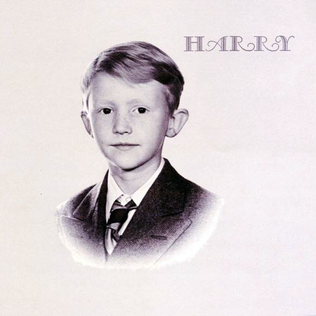
Harry is the fourth studio album by Harry Nilsson, released August 1969 on RCA. It was his first album to get onto Billboard Magazine's Billboard 200 chart, remaining there for 15 weeks and reaching #120.

A Little Touch of Schmilsson in the Night is a 1973 album of classic 20th-century standards sung by American singer Harry Nilsson. The album was arranged by Frank Sinatra's arranger Gordon Jenkins, and produced by Derek Taylor. This album is notable in being a standards album produced a decade before such works started to become popular again.

Goodnight Vienna is the fourth studio album by Ringo Starr. It was recorded in the summer of 1974 in Los Angeles, and released later that year. Goodnight Vienna followed the commercially successful predecessor Ringo, and Starr used many of the same players, including Billy Preston, Klaus Voormann, Robbie Robertson, Harry Nilsson, and producer Richard Perry. The title is a slang phrase meaning "it's all over".

"Those Were the Days" is a song composed by Boris Fomin (1900–1948) but credited to Gene Raskin, who put a new English lyric to Fomin's Russian romance song "Dorogoi dlinnoyu", with words by the poet Konstantin Podrevsky. The song is a reminiscence of youth and romantic idealism. It also deals with tavern activities, which include drinking, singing and dancing.

"Coconut" is a novelty song written and first recorded by American singer-songwriter Harry Nilsson, released as the third single from his 1971 album, Nilsson Schmilsson. It was on the U.S. Billboard charts for 14 weeks, reaching #8, and was ranked by Billboard as the #66 song for 1972. It charted in a minor way in the UK, reaching #42. "Coconut" did best in Canada, where it peaked at #5.
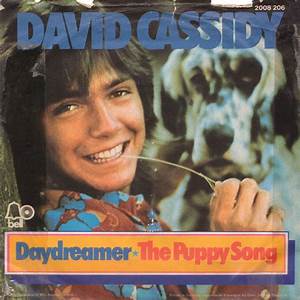
"Daydreamer" is a song by the American singer David Cassidy.

"Simon Smith and the Amazing Dancing Bear" is a song written by Randy Newman, about a young man of modest means who entertains affluent diners with his dancing bear. The Alan Price Set released a version as a double A-side with "Tickle Me" on 24 February 1967, and it reached number four on the Record Retailer chart in Britain. The success brought Newman to public attention as a songwriter; he recorded the song himself for his 1972 album Sail Away.

"Everybody's Talkin' (Echoes)" is a song written and recorded by the American singer-songwriter Fred Neil in 1966 and released two years later. A version of the song performed by the American singer-songwriter Harry Nilsson became a hit in 1969, reaching No. 6 on the Billboard Hot 100 chart and winning a Grammy Award after it was featured in the film Midnight Cowboy. The song, which describes the singer's desire to retreat from the harshness of the city to a more peaceful place and an easier life, is among the most famous works of both artists, and has been covered by many other notable performers.

For the Love of Harry: Everybody Sings Nilsson, released on 9 May 1995 by Musicmasters, is a tribute album by various artists and dedicated to the songs of American musician Harry Nilsson. The album was released the year after Nilsson's death. Proceeds went to the Coalition to Stop Gun Violence.
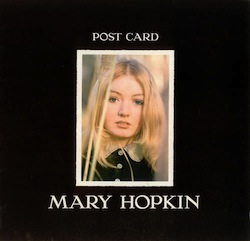
Post Card is the debut album by Mary Hopkin. It was produced by Paul McCartney and released by Apple Records in February 1969 in the UK and in March 1969 in the US. It reached number 3 in the UK and number 28 in the US.
"All for the Beatles" is a song written and released in 1964 by Harry Nilsson and John Marascalco. It was released as a single with the alternative title "Stand Up and Holler" under Nilsson's pseudonym Foto-Fi Four and was packaged with a synchronized standard 8 mm film of The Beatles first arriving in the United States in 1964.
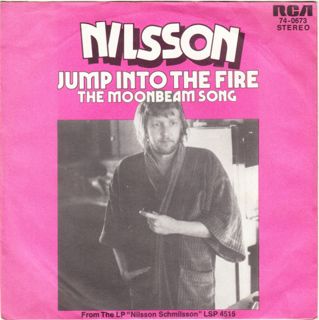
"Jump into the Fire" is a song by American singer-songwriter Harry Nilsson from his 1971 album Nilsson Schmilsson. It was also issued as the album's second single, after "Without You", and peaked at number 27 on America's Billboard Hot 100 chart and number 16 in Canada.
"This Could Be the Night" is a song recorded by the American band Modern Folk Quartet (MFQ) in 1965. The lyrics describe a couple on the verge of conquering their inhibitions. Written in tribute to the Beach Boys' leader Brian Wilson, the song is one of three that are credited jointly to Harry Nilsson and Phil Spector, although Nilsson submitted that he was the sole writer on a 1966 copyright form.

"You're Breakin' My Heart" is a song by American singer-songwriter Harry Nilsson, appearing on his 1972 album Son of Schmilsson. It is notorious for the opening line, "You're breakin' my heart / You're tearin' it apart / So fuck you".

"Gotta Get Up" is a song written by American singer-songwriter Harry Nilsson and the opening track from his 1971 album Nilsson Schmilsson. It was first released as the B-side to his single "Without You". "Gotta Get Up" is an upbeat pop song with a music hall feeling and lyrics about transitioning from carefree youth to adult responsibility. Nilsson based the lyrics on his experiences working at a bank and on his parents.
In Concert was a British music television series, broadcast live by the BBC between 1970 and 1976. Each episode consists of a one-hour live performance by a single singer songwriter. The series premiered on 9 October 1970 on BBC Two. It was created, produced, and directed by Stanley Dorfman.
References
- 1 2 3 "David Cassidy: Artist Chart History". Official Charts Company.
- ↑ Shipton, Alyn (2013). Nilsson: The Life of a Singer-Songwriter. OUP USA. pp. 75–76. ISBN 9780199756575.
- ↑ Shipton, Alyn (2013). Nilsson: The Life of a Singer-Songwriter. OUP USA. pp. 80–81. ISBN 9780199756575.
- 1 2 Kutner, Jon; Leigh, Spencer (2010). 1,000 UK Number One Hits. Omnibus Press. ISBN 9780857123602.
- ↑ Shipton, Alyn (2013). Nilsson: The Life of a Singer-Songwriter. OUP USA. p. 95. ISBN 9780199756575.
- ↑ "Nilsson - Maybe / The Puppy Song".
- ↑ "Bell Ringing Loud and Clear". Billboard. October 27, 1973.
- ↑ Davis, Sharon (2012). Every Chart Topper Tells a Story: The Seventies. Mainstream Publishing. ISBN 9781780574103.
- ↑ "Top 10 Best Selling UK Singles of 1973". Pop Record. Archived from the original on 20 February 2014.
- ↑ Barker, Rob (December 1, 2020). "339. David Cassidy – Daydreamer/The Puppy Song (1973)". Every UK Number 1.
- ↑ Kent, David (1993). Australian Chart Book 1970-1992 . St Ives, N.S.W.: Australian Chart Book. ISBN 0-646-11917-6.
- ↑ "Top Selling Singles for 1973". Sounds . London, England: Spotlight Publications: 4. 5 January 1974.
- ↑ "National Top 100 Singles for 1974". Kent Music Report. December 30, 1974. Retrieved January 15, 2022– via Imgur.
- ↑ Courrier, Kevin (2005). Randy Newman's American Dreams. ECW Press. p. 133. ISBN 1550226908 . Retrieved 2013-05-26.